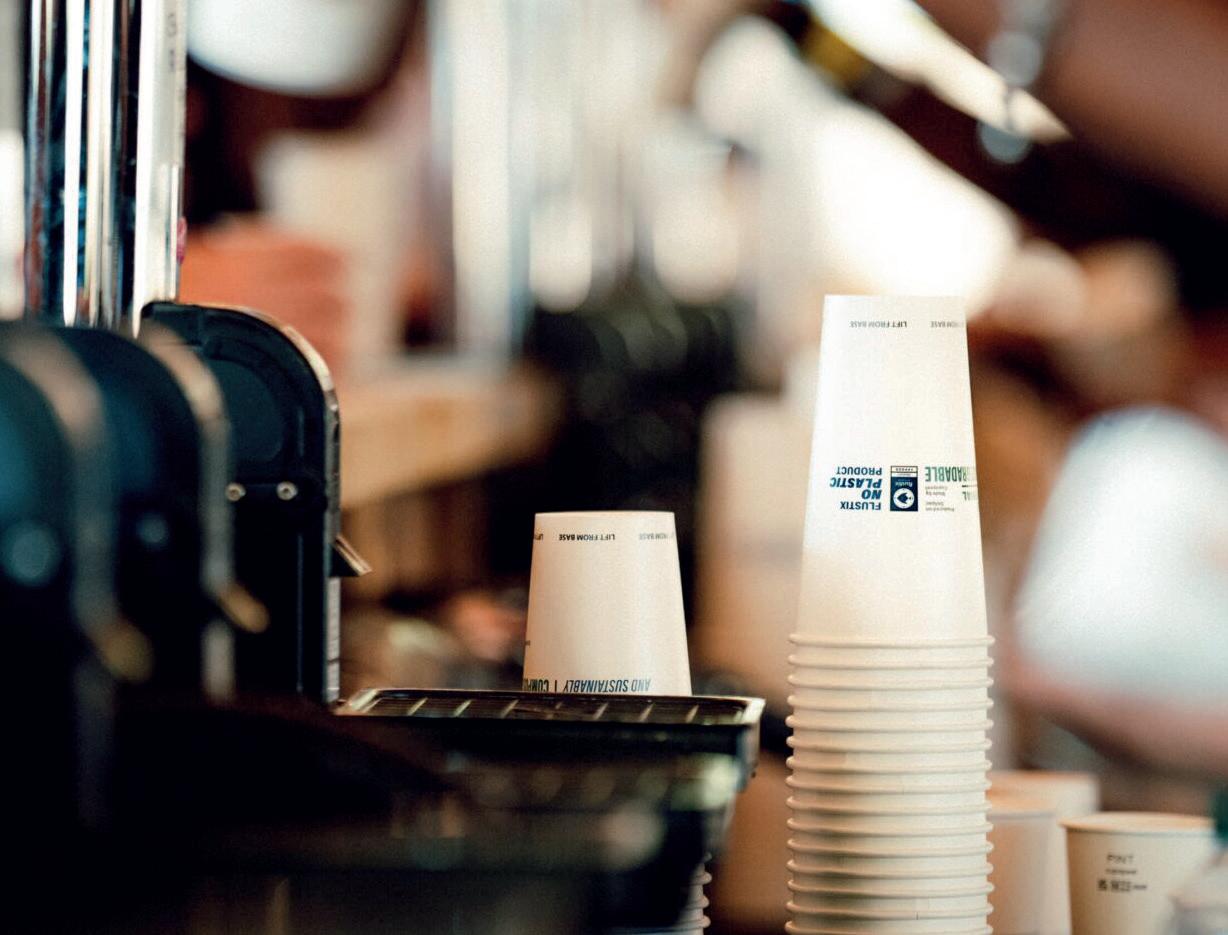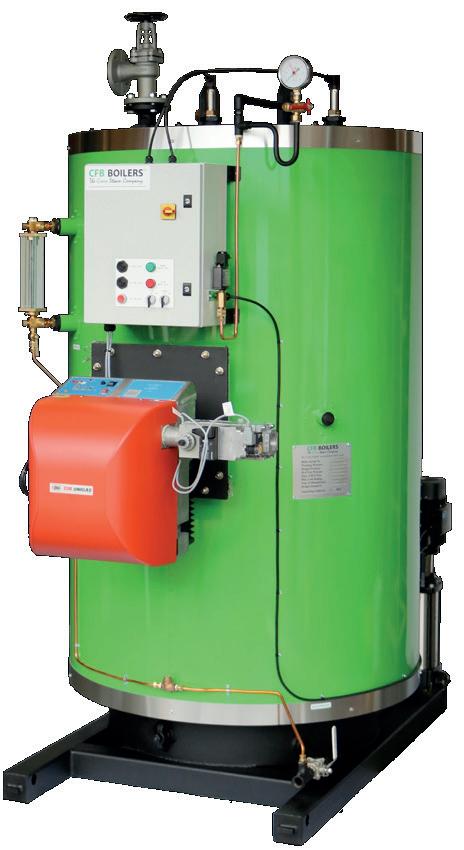
6 minute read
Business profile: Five Points Brewing Co
How did you come to found Five Points?
“Ed had pubs in London, back in the late 2000s and early 2010s. And I worked in one of his pubs in various positions, including manager and head chef at one point. Ed then opened a bar in Shoreditch called Mason and Taylor, which was one of the early craft beer bars in the Capital, and he actually went on to sell that and then it became BrewDog Shoreditch. So that's where the money came from. We'd always been very passionate about beer and knew the American scene fairly well and we just felt like we could really bring something to the UK scene. I think when we started brewing there were about 20 to 25 breweries in London. And we felt like we were almost a bit late to the party. I think now there's over 100 breweries in London, maybe up to 120, I think. So we're now seen really as the old guard, certainly amongst the newer independent breweries, which is quite bizarre. After working with Ed, I left and went and became a brewer at East London Brewing. So that's sort of where I cut my teeth, as it were. And then we met up over a beer, and were talking about it, and it just made sense to do something ourselves.”
What is the ethos behind the business?
“I don't think we knew it would grow to quite the size that we have today. We definitely wanted to be responsible employers, that was always really important to us. The Living Wage, that was something that we looked at very early on, and all of our electricity was green, pretty much from the outset. Those are things that we're passionate about, about being a sustainable business, in all senses of the word. We also grew up drinking traditional cask ales over here, but loved what was coming over from the States. So having visited the States, we wanted to marry those New World styles with these more traditional British styles as well, in terms of the beer. And I think that's something that we have become known for over time.”
Your beers are unpasteurised and unfiltered, why did you decide to go down that route and does it present any challenges?
“I don't think we even debated it, it was just what we wanted to do. From the outset, we knew it was the route we wanted to go down, we felt like there was a lot more flavour there. There's nothing being taken away from the beer, which happens in filtration, and we're not changing the flavours in any way due to pasteurisation. It's just the beer in its purest form. As cliched as that is, this is where we felt there was the most flavour and most aroma in the beers. There are challenges. We have to be very careful about hygiene. And there are certain beer styles that we have to be particularly careful about - specifically, if we're involving fruits, which can add sugars to the process, which can then cause re-fermentation later on. But even these days, it's not something that's really questioned. It's just how we do things and how we want to do things.”
When did you open your taproom and how has that side of the business developed since?
We'd
“The original brewery site was near Hackney Downs, which is an overground station in Hackney. And we were in a railway arch, as were many breweries at the time. We had always wanted to open a taproom, but there was just no space on the site. So we did some events, and we did brewery tours, but there was no way we could have a permanent taproom installation. The site we’re on now we actually took on in 2015, but it's owned by Hackney Council and the site was up for redevelopment, and they wouldn't give us a long term lease on the site. So there was no point investing in moving the brewery here, if we could be thrown out in six months. And then Covid came along, and the Council's plans changed, and they offered us a long term lease. At the same time, the landlords of the railway arch were trying to put the rent up by ridiculous amounts. So it just made sense to consolidate all of our operations, as we had a long term secure lease at the site we're in now. So we moved everything down. And actually, it was one of the few good things that came out of Covid, because our demand for beer was so low that we actually had the time to do that relocation in January 2021. So we opened the outside yard of the taproom pretty much straight away on the new site. And then we developed an indoor taproom which we didn't actually launch until November 2021. And that’s open, at the moment, Thursday, Friday and Saturday.”
Do you have any plans to expand your retail side?
“Since 2015 we’ve had the pub, the Pembury Tavern that’s owned by Five Points. In terms of expanding, we always keep our eyes open and ears to the ground for any changes of hands or pubs up for sale, but I think it needs to be the right opportunity. And if the right opportunity comes along, then we will definitely go down that route.”
What does sustainability look like at Five Points?
"Since the start, we've had green electricity and energy. We started with that mindset. But there's plenty more that we can do, and plenty more that we're looking at doing. But it's always been part of the conversation, when there's been changes to be made. When we were relocating the brewery, for example, we were looking at how we might be able to introduce or improve sustainability within that. And there's a lot of projects that we're looking at, at the moment - feasibility studies on how we can improve things again. CO2 recovery is a big one that we're looking at at the moment. We're looking at the potential for solar panels on the roof - because we don't own the building that’s not that straightforward. And obviously, a benefit of being in London is that a lot of our deliveries are close by so we're investigating whether we can move to an electric fleet of vehicles.”
Times are tough out there, and there are a lot of breweries closing. So I think, first and foremost, it's about making sure that we're on top of things and continue to be a sustainable business, both from a green stance, but also financially this year.


What do think the sector could be doing to build a more diverse workforce?
“We offer an apprenticeship scheme, which is something in our early days that we worked quite closely with Hackney Community College on. The provider has changed a few times since then, but I think the brewing apprenticeship is really good. And I think that could really help if it's sold in to the right communities. It's a real pathway to a career, the idea being that you don't need a specialist knowledge or education to come in to the brewing sector. I think that's really valuable. And I think that could be rolled out further. I'm on the committee for the London Brewers Alliance as well. And one of the things we're looking at at the moment is mentorship scheme as well. Whether there might be ways to increase diversity by using mentors and linking them up with mentees. There's, a local charity we work with too that gets disadvantaged children into work.”
What are your key goals for the business in
2023 and beyond?
“Times are tough out there, and there are a lot of breweries closing. So I think, first and foremost, it's about making sure that we're on top of things and continue to be a sustainable business, both from a green stance, but also financially this year. Making sure we can continue to do our best to counter these rising energy costs and other ingredient inflation. And then, above and beyond that, looking at the retail estate, and improving sustainability. Just focusing on improving the business as opposed to growing it out and out. We haven't put our prices up for 12 months, so we’re due a price rise, but we don't want to pass on all the costs, we don't want the price of a pint to become £10. But we also need to be able to pay all of our wages and all of our overheads. So that's a really tricky balancing act.”












